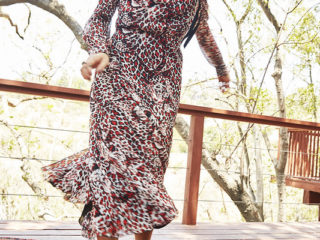This post is a part of a series called “Help Me Understand,” where we practice the art of dialogue amongst diverse opinions. The focus is to come around the table and learn to have healthy conversations with people whose views are different from our own.
A few weeks ago, at the end of a long day, I opened my Instagram app. I didn’t post anything. I just mindlessly scrolled through my friends’ stories and pictures.
I saw happy faces posing with Mickey at Disney World and tanned bodies on Caribbean beaches. Twenty minutes later, I closed the app, feeling dissatisfied that our family’s week had been uneventful and boring compared to others.
Have you been there too after signing out of your favorite social media app—envious of the experiences or situations of others and less content with the place you find yourself in? If so, you’re not alone.
Academic study after study has identified links between social media use and poor mental health (such as anxiety, depression, stress and negative emotions). Before you step away from your social apps in response to this, there are a lot of positive features of social media as well—such as connecting with loved ones and groups, helping raise awareness of important issues and events and sharing life’s milestones and special moments. Yet, since there is a direct connection between mental health and social media use repeatedly, it is important to understand why.
To start, you need to know that it’s not simply the amount of time spent on social media that’s related to mental health issues. When it comes to social media use, the general consensus is that the nature of our experiences, rather than the total time spent on social media, is what influences us. There are some people whose overall well-being is improved by spending time on social media, demonstrating that social media can be used in ways that benefit rather than damage our mental health.
Here are three components of our social media experiences that can impact our personal well-being.
Are we active or passive social media users?
First, we need to examine how we are spending our time on social media, as this makes a difference in how we are affected. An active user could be described as someone who interacts with others through messages and comments, creating content, sharing updates and/or pictures and posting information to which others can respond. A passive user is someone who scrolls and browses through other people’s content, not engaging with other users and perhaps reposting links not aimed at anyone in particular (with information not related to yourself and your preferences).
Research shows that it’s passive use, rather than active use, of social media that can lead to negative emotions and depression symptoms (especially for women and girls). When we simply scroll through news feeds and pictures and remain disengaged, we are more likely to feel left out and to fall into the comparison trap.
As people primarily post about the positive aspects of their lives, rather than the messy uncomfortable stuff, it’s not surprising that this quiet intake of others best images can have a negative effect on our thoughts and emotions. On the other hand, when we actively engage in social media, we often feel more connected to and supported by our networks. In essence, we are less anxious and lonely.
How frequently do we check our social media sites?
Next, we need to look at our social media use habits and consider how frequently we are checking our apps/sites. Remember, it’s not the total amount of time that we spend on these sites that can have a detrimental impact on us. Instead, it’s how we use these sites.
When a person thinks about their social media frequently, often checking their apps throughout the day, they again are more likely to experience social media-related anxiety and other negative mental health outcomes. In research, this is called “problematic social media use.”
When you fall into problematic social media use, you feel addicted to checking your social media and may find that your constant use of it has had a negative impact on your job or studies. This is easier to slip into if you already experience social anxiety in your “offline” life, as online exchanges are not as difficult (since they don’t require face-to-face interactions). Problematic social media use can heighten your anxiety and depression if you are already socially anxious.
Are we being authentic online?
Finally, we need to ask if we are being authentic on social media. Take a moment to think about your own social media accounts and how you represent yourself online. Are you presenting your true/core self or just an idealized version? When we believe that we are being authentic online, we actually experience more positive emotions, and in turn, that authenticity contributes to our positive mental and emotional well-being.
Also, we need to consider the authenticity of our online connections. We are much happier when we connect with people we have (or previously had) face-to-face relationships with rather than those we only know in the “online environment.” When we use social media to build on our offline relationships it can actually help improve our mental health. On the flip-side, our mental health can be negatively affected if our online relationships aren’t connected to our face-to-face ones (in other words, we are primarily interacting with/following those we haven’t met in person). It definitely benefits us to be authentic in both our presentation of ourselves and our choice of connections online.
Full disclosure, I admit I’ve been more of a passive social media user—scrolling and lurking on Instagram and Facebook, using social media to “zone out” at the end of the day rather than an active user who is connecting with friends and creating content of my own. In light of the research on social media and negative mental health outcomes, it’s no wonder that this pattern of use I’ve fallen into has left me dissatisfied and thinking about taking an indefinite break from the apps (which, by the way, many find to be a helpful practice).
Yet, there’s also another path. Although there are a lot of potential pitfalls, social media use can actually increase our well-being—under the right conditions. When we’re authentic and active in our social media lives and we resist internal pressures to frequently check our accounts throughout the day, we will probably find our social media experiences to be more fulfilling and emotionally gratifying.
These truths have led me to rethink my approach to my social media use and my urge to give it up all together. I’m now ready to use it to deepen my offline relationships and to share authentic pieces of my life with my friends and family. Will you join me?
What are your social media habits like? How can you become an active social media user versus a passive one?
Image via Sami Drasin, Darling Issue No. 22











